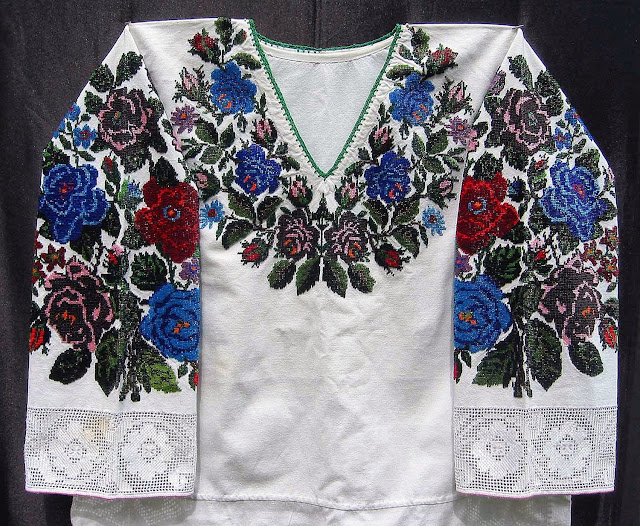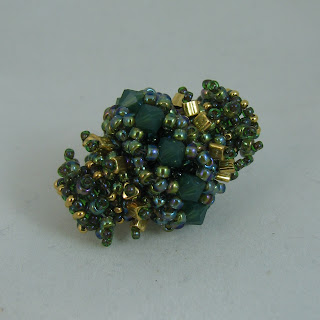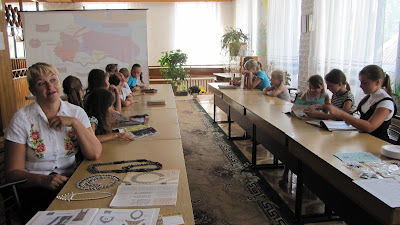 |
| Czech seed beads with iris, silver-lined, matte painted stripe and opaque finishes. From "Beader's Paint Box", 2013 seminar |
I'm concentrating on the plethora of round seed beads made of drawn glass though there are many other styles, i.e. bugles, created by the described process. In the 15th century on the island of Murano near Venice, a hollow mass of glass was literally drawn or pulled into a long tube like taffy. This glass cane tube was then cut into small pieces to produce seed beads which were then tumbled to soften the edges and graded. The secret made its way out of Murano and a glass industry developed in the Bohemian forest and mountains of todays's Czech Republic.
 |
| A section from an engraving showing glass being drawn. The plate is from Grands Hommes and Grands Faites de L'industrie, 1880. courtesy of www.bigbeadlittlebead.com |
New processes and machines were invented in the 1860s and bead makers were able to achieve uniformity of colors and size in beads. Since the end of the 17th century, Czech beads became a major production item. Bead became more accessible to the people in Europe and beadweaving and bead embroidery exploded. They also became a trade item to Africa and the Americas.
 |
| Chieftan's headdress with seed bead birds on beaded base. Yoruba, Africa Seen at African Village Show in Tuscon, 2013 |
 |
| Beadwork on souvenir items by Iroquois, Mohawks, Tuscarora. Note seed bead card. Naomi Smith Collection, ON, 2005 |
 |
| "Gerdany" reproductions and original designs for sale at a Festival in Ukraine, 2013 Netting and loomworked bracelets, chokers and a stylish "V' courtesy of Irena Halaschak on FB |
Round and cylindrical beads are sized by aughts, a number based on how many beads fit within a given measurement. The aught numbering system ranges from a larger 1/ to a very fine grain of sand 24/.
 |
| Aught # on left. Note how many beads fit in a centimeter. courtesy of Lisa on FB |
1/ or 2/ = crow bead
3/ or 4/ = trade bead
5/ or 6/ = pony bead
6/ is a larger bead used for modern beadweaving and knitting
8/ = called “medium” bead in Rypan tutorials
8/ is a midway between the 6/ and 10/ or 11/ and used for modern
beadweaving and knitting
10/ or 11/ = fine beads used for beadweaving, knitting and embroidery
10/ seed is commonly used in First Nations beadwork and 'gerdany'-making
10/ Czech is interchangeable with 11/ Japanese in Rypan patterns
10/ Czech is interchangeable with 11/ Japanese in Rypan patterns
11/ Japanese is a very common fine seed bead
11/ Czech seed bead is smaller than 10/
13/ = Charlotte bead has an additional facet to reflect light
15/ = very fine bead
15/ is the smallest bead in modern production
18/, 20/, 22/ = very tiny beads which are no longer in production.
The higher the aught #, the tinier the bead.
These tiny seed beads are only in old beadwork in museums and collections worldwide
Rocailles are round seed beads with a lining inside the bead creating in Venice. These used to have a silver lining (s/l), but today refer to any type of color or metallic lining. Preciosa®, the largest Czech manufacturer still refers to the round seed beads as rocailles and divides them in uncoated and coated categories. Many undergo further finishes.
The round seed bead has two distinctly different shapes depending on manufacturer. The Czech seed beads are more donut-shaped and tend to stretch out a charted design within certain techniques, i.e. loomwork and pictorial mosaic. They are sold loose or strung in hanks. The Japanese beads are more square-ish with rounded corners. Never mix the two seed bead types within a beadwoven or loomwoven pattern because the shapes are distinctly different. Mixing different shapes and sizes is fine in stringing, some netting and herringbone styles.
 |
| Czech 8/ medium sized; 6/ purple-lined pony; 2/ purple-lined crow; Japanese 11/ silver-lined fine seed bead Wisteria Textured Net for narrated Netting Primer |
 |
| 10/ s/l gold and brown rocailles with a touch of s/l blue on navy iris were used in M Rypan's netted kllim This kilim was my first article,"Ukrainian Netting'', Bead and Button, Jun 2003 Indigo Kilim kit or pattern, 2004 |
Cylindrical beads are flat and fit nicely together in pictorial type of stitching, i.e. mosaic or loomwork. Because of their shape, they then to flatten out a charted pattern so you need to make many more repeats to reach your desired length.
 | ||
Iva's Daisies using Delica cylinder beads by M Rypan, 2003
|
Innovations never cease. Now we have hybrid beads which where some Japanese beads are sent to the Czech Republic for their traditional finishes. This collaboration yields unique brilliant beads.Today’s description are lengthy because they makers are constantly experimenting with new finishes. Even transparent beads have AB coatings.
 |
| Start of a textured Herringbone with hybrid Picassa olive (Sour Apple) 6/, #2 s/l amethyst, rainbow rosaline/op. purple-lined 11/, deep magenta-lined AB hex beads |
 |
| The Sour Apple 6/ hybrid beads really give this herringbone zing Beaded Soutache Herringbone kit, 2012 |
Finishes affect the perception of the bead especially when they are placed amongst other beads or backgrounds. Matte beads recede. The opaque color seem to come forward. Silver-lined beads reflect light. Transparent beads look great in windows with light behind them, but change drastically when against skin color or used in small doses within a beadwoven pattern.
Iris beads have and Aurora Borealis finish and no longer are limited to a few classic metallic finishes.
Color placement of seed beads can totally alter the look and mood of a piece.
Color placement of seed beads can totally alter the look and mood of a piece.
 |
| Netting with silver-lined red on green iris background by M Rypan Red Green Kilim kit, 2004 |
 | ||
| Same netting pattern with metallic gold on green iris. Note s/l red beads Mediterranean Kilim kit, 2004
|
 |
| Pearl-tipped Twig Cascade commissioned for Katrusia's wedding, 2012 Twig Chip Cascade Netting Pattern - downloadable |
 |
| Bead embroidery on a sheep skin 'kyptar' vest from Bukovyna, Ukraine, 1950's Maria Rypan Collection, 2008 |
 |
| Bead embroider and 'tsyrka' whitework trim on 'sorochka' chemise from Kitsman, Bukovyna region, 1950s Nastasiya Marusyk Collection, IL 2007 |
 |
| Bead embroideed 'sorochka' using cut and round seed beads from Kitsman, Bikovyna region, 1950's Nastasiya Marusyk Collection, IL, 2007 |
 |
| Vanessa reinterprets the rose in the Diagonal weave, Bead Fx April 13 Top: 3-color Rhombic Medallion Pattern Mid: Diagonal Rose Medallion Pattern |
 |
| Color placement of the seed beads create a dynamic pattern beaded by Barbara Glennon, NJ, 2011 based on M Rypan pattern in Netted Mesh Collars: Lessons #1 |
 |
| Original Zigzag netted collar with a three step increase with design created bicolour placement seed beads Created for workshop at ROM in conduction with "Legacy of Scythian Gold" exhibit Netted Zigzags downloadable pattern |
 |
| Netted Triple V's with silver-lined accent and contrast beads creating the design done in a vintage black iris bead by M Rypan Triple V kit, 2000 Triple V pattern included in Jagged Mesh Net: Lessons #2 book |
 |
| Color and beadweaving technique creates this style. Start beading in the center. Add swags last. Deep V Cascade kit or pattern, 2001 |
Seed beads are donut-shaped and fall with the hole up making it easy to peck them and slide up onto needle when using a Chinet® paper plate surface. These plates enable beading to be a very portable activity when tucked into a ziplock bag along with a mini kit of beads, clippers, needle and thread.
 |
| Picking up bead tips in "Beadweaving Basics"on Maria's narrated Netting Primer |
Great guides for all types of beading: BigBeadLittleBead Find out how many beads you get per hank or gram.. What type of thread to use with different bead sizes.
It all starts with two or three different beads colours, a little beadweaving or embroidery and a touch of creativity...
Happy beading!
Maria
Maria




























